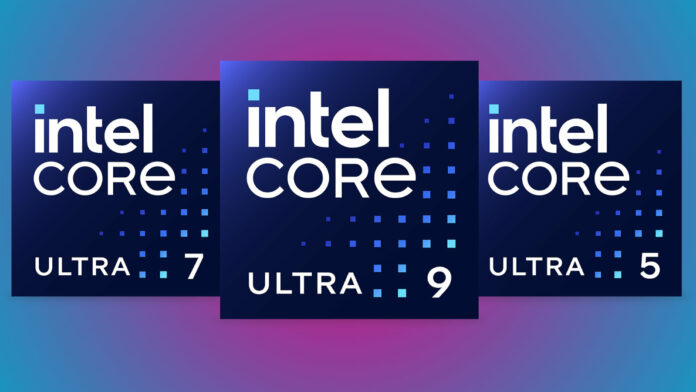While we already know much about Intel Arrow Lake clock speeds, up until now three processors have managed to keep their frequencies hidden. However, it was only a matter of time before information on the remaining Core Ultra 200 CPUs came to light. Thanks to one last leak, we now have almost all the core specs of the series to hand, save one.
Based on the 6 SKUs Intel has in the works, which grows to a whopping 16 if you account for every K, KF, and T variant, the company is leaving no stone unturned in its mission to attain desktop dominance. There’s every chance Arrow Lake could emerge as the best CPU architecture of the year, as Zen 5 flounders in the wake of its unfortunately messy launch. Contrary to earlier reports, the company is also seemingly planning at least one Core Ultra 3 SKU.

Thanks to leaker OneRaichu on X, we now have clock speeds for Core Ultra 5 245 & 235. The user also shared frequencies for Core Ultra 3 205, leaving room for another potential processor in the form of Core Ultra 3 215. It’s possible that Intel could skip the latter chip altogether but it seems odd to leave such a gap given the naming pattern of the other SKUs.
We’ve taken our table from the previous Arrow Lake specs leak, and filled in the gaps using OneRaichu’s frequencies. We’ve highlighted all changes in bold for your convenience. The only thing missing now is the TDP of Core Ultra 3 SKUs.
Intel Core Ultra 200 specifications
| CPU | TDP | Cores | Base (P/E) (GHz) |
Turbo (P/E) (GHz) |
TVB | TBMT 3.0 | TMBT 2.0 |
|---|---|---|---|---|---|---|---|
| Core Ultra 9 285K | 125W | 8P+16E (24) | 3.7/3.2 | 5.4/4.6 | 5.7GHz | 5.6GHz | 5.5GHz |
| Core Ultra 9 285 | 65W | 8P+16E (24) | 2.5/1.9 | 5.3/4.6 | 5.6GHz | 5.5GHz | 5.4GHz |
| Core Ultra 9 285T | 35W | 8P+16E (24) | 1.4/1.2 | 4.7/4.5 | N/A | 5.4GHz | 5.3GHz |
| Core Ultra 7 265K | 125W | 8P+12E (20) | 3.9/3.3 | 5.2/4.6 | N/A | 5.5GHz | 5.4GHz |
| Core Ultra 7 265KF | 125W | 8P+12E (20) | 3.9/3.3 | 5.2/4.6 | N/A | 5.5GHz | 5.4GHz |
| Core Ultra 7 265 | 65W | 8P+12E (20) | 2.4/1.8 | 5.1/4.6 | N/A | 5.3GHz | 5.2GHz |
| Core Ultra 7 265F | 65W | 8P+12E (20) | 2.4/1.8 | 4.6/4.5 | N/A | 5.3GHz | 5.2GHz |
| Core Ultra 7 265T | 35W | 8P+12E (20) | 1.5/1.2 | 5.0/4.5 | N/A | 5.3GHz | 5.2GHz |
| Core Ultra 5 245K | 125W | 6P+8E (14) | 4.2/3.6 | 5.0/4.6 | N/A | N/A | 5.2GHz |
| Core Ultra 5 245KF | 125W | 6P+8E (14) | 4.2/3.6 | 5.0/4.6 | N/A | N/A | 5.2GHz |
| Core Ultra 5 245 | 65W | 6P+8E (14) | 3.4/2.9 | 4.9/4.5 | N/A | N/A | 5.1GHz |
| Core Ultra 5 235 | 65W | 6P+8E (14) | 3.4/2.9 | 4.8/4.4 | N/A | N/A | 5.0GHz |
| Core Ultra 5 225 | 65W | 6P+4E (10) | 3.3/2.7 | 4.7/4.4 | N/A | N/A | 4.9GHz |
| Core Ultra 5 225F | 65W | 6P+4E (10) | 3.3/2.7 | 4.7/4.4 | N/A | N/A | 4.9GHz |
| Core Ultra 3 215 | TBC | 4P+4E (8) | TBC | TBC | N/A | N/A | TBC |
| Core Ultra 3 205 | TBC | 4P+4E (8) | 3.9/3.3 | 4.7/4.2 | N/A | N/A | 4.8GHz |
With AMD seemingly content to forgo any Ryzen 3 SKUs, Core Ultra 3 205/215 could prove a budget boon to Intel. After all, Core i3-12100F and its subsequent Raptor Lake successors left us impressed with their performance for their lowly price. Although, the current affordability of Ryzen 5 7600X does give AM5 a reprieve of sorts in the short term.
In our Ryzen 5 9600X vs. Core i5-14600K deep dive, we found the latter to be the better value buy overall. Core Ultra 5 245K will serve as the primary successor to the latter chip, but there are at three other chips flying the Ultra 5 flag. The value of Core Ultra 5 245, 235, and 225 appears questionable given how close in specification they are. However, I’ll save any conclusive assessments for launch, after we’ve gone hands-on with these chips.
Recently leaked Arrow Lake benchmarks give me pause for any hope of serious performance gains relative to Zen 5 or Raptor Lake. It’s difficult to know how much stock to put in these comparisons, particularly given the gains we’ve seen on Ryzen processors via Windows updates. Come on, Intel, don’t keep me waiting much longer.
